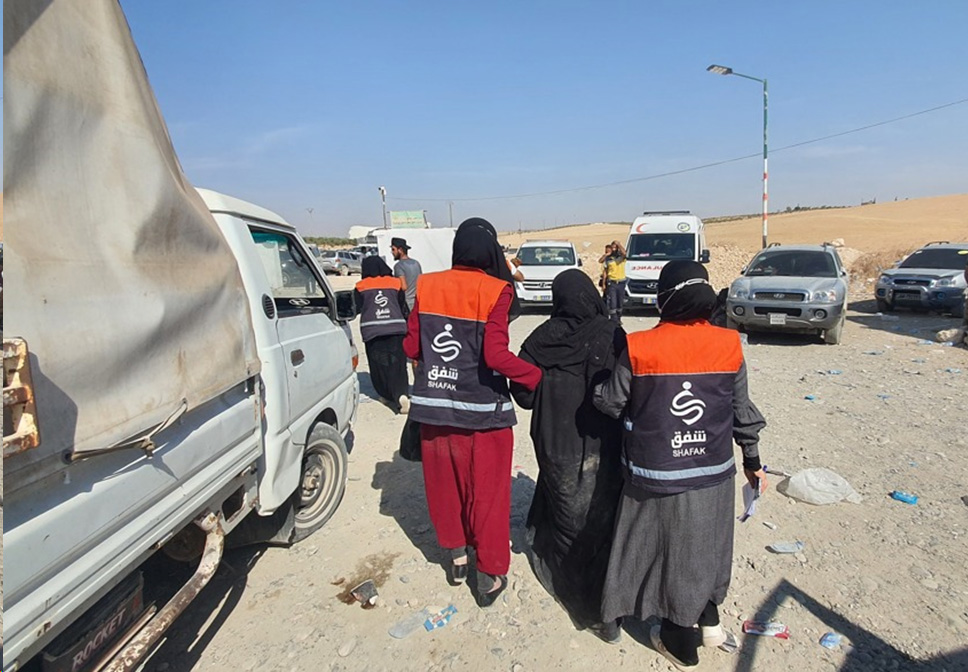25 November 2024 – When Abbas* arrived in Lebanon in 2014 he was in his mid-20s, seeking safety and work away from the conflict in Syria.
 At the Aoun al-Dadat crossing, health partners provide psychosocial support to help families – especially women and children – feel safe. Photo credit: Shafak Organization“I went alone, hoping to find a better life,” he says.
At the Aoun al-Dadat crossing, health partners provide psychosocial support to help families – especially women and children – feel safe. Photo credit: Shafak Organization“I went alone, hoping to find a better life,” he says.
For nearly a decade Abbas managed to build a life, finding occasional work, marrying and having 4 children. By September 2024, however, the escalating violence in Lebanon left his family with no choice but to return to northwest Syria.
“We were renting a small apartment, and the financial situation was becoming unbearable,” Abbas says. “I was the only one working, and expenses kept piling up with four children. Then the shelling started. Every night, we had to evacuate to safer areas, only to return in the morning.”
After a week of constant fear, Abbas and his wife decided they had no choice but to leave. “We tried moving to a different neighborhood, but even there, the shelling continued. My children couldn’t sleep; they were terrified. That’s when we realized it was time to return to Syria.”
For many families like Abbas’s, the decision to return is not made lightly. It is often a last resort, driven by the worsening conditions in Lebanon. Northwest Syria remains unstable, offering limited resources and safety, but families are left with no other choice as they try to rebuild their lives.
A difficult journey
The journey was grueling. Families crossing into northwest Syria often have to wait for days at overcrowded border crossings, facing harsh conditions and delays. Abbas’s experience was no different. “We were stopped at checkpoints and forced to wait for hours without knowing when we could move. Traveling with 4 small children, including my 10-month-old, made everything even harder,” he shares.
Tragically, during the journey Abbas’s wife suffered a miscarriage. The emotional and physical toll has left her weakened and she is still struggling to recover.
“My wife is strong,” says Abbas, “but this loss has been very hard on her.”
After 8 exhausting days, Abbas and his family finally arrived in northwest Syria, physically and emotionally drained.
Health partners extend support to Abbas’s family
When they crossed into northwest Syria, Shafak, a humanitarian organization stationed near the Aoun al-Dadat crossing, was among the first to welcome them. “The team greeted us with kindness,” Abbas recalls. “They played with the children and helped them feel safe —something we hadn’t felt in a long time.”
Supported by UNHCR, Shafak is also coordinating the response of local organizations to support people returning. The team provided Abbas’s family with much-needed supplies, including food and nutritional support for the children, as well as psychosocial help. “They offered psychological first aid for my wife and spent time with my children to help them feel less anxious,” says Abbas.
“For many families like Abbas’s, the trauma of displacement does not end when they cross the border. Our team provides immediate care, including psychosocial support, to ensure that families—especially women and children—feel safe and supported in these difficult moments,” says a Shafak representative.
In northwest Syria, local health partners, with technical support from WHO, have scaled up services to address the needs of displaced families like Abbas’s. These include emergency care, vaccination campaigns, and mental health support at border crossings and in host communities.
Abbas now looks to rebuild
Abbas’s family now lives in a small, unfinished house in Jarablus, provided by his brother. “It’s better than living on the streets,” he says, “but it is not easy. We have no heating, and the roof leaks when it rains. The children still get scared by loud noises—they remember everything that happened in Lebanon and during the journey.”
The influx of over 8,100 Syrians fleeing Lebanon since late September has stretched the region’s already fragile health system. At border crossings like Aoun al-Dadat, medical teams provide immediate screenings and care, while ambulances are on standby for urgent referrals. Vaccination teams work to ensure children are immunized against diseases like polio and measles, particularly as many returnee children lack updated vaccinations.
Despite these efforts, the needs are vast.
“I want my kids to go to school, but I cannot afford it. My family is still distraught and in need of continued psychosocial support,” Abbas says.
Mental health support has also been critical. Families exposed to conflict and displacement often carry deep psychological scars. Health partners, like Shafak, continue to deliver psychosocial support to new arrivals, referring severe cases to healthcare centres for ongoing care.
For Abbas, the journey is far from over, but he is still hopeful. “I am grateful for the help we have received, but we will pick back up and try to rebuild our lives again. I owe it to my children and their future to keep going,” he says.
*Name changed to protect identity


